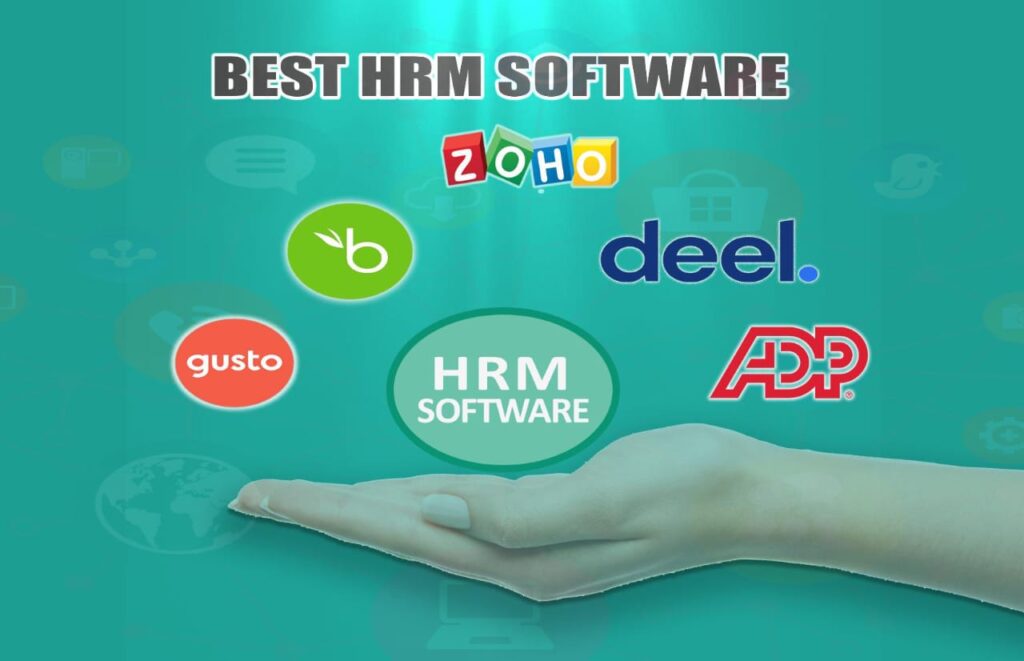In 2025, Human Resource Management (HRM) is no longer just about tracking employee data—it’s about creating a smarter, more integrated workplace where technology empowers teams, ensures compliance, and enhances the employee experience. As the world of work continues to evolve, HR departments across the globe—and especially in tech-savvy regions like the UK, North America, and Europe—are adopting intelligent, cloud-based HRM systems to streamline daily operations, drive engagement, and align HR with broader business strategy.
From automated onboarding and performance reviews to AI-driven analytics and real-time absence tracking, today’s HRM tools serve as command centers for everything workforce-related. With regulations like GDPR, remote work culture, and employee wellbeing becoming priorities, the need for reliable, secure, and scalable HRM platforms is greater than ever.
Whether you’re a startup with 10 employees or an enterprise managing global teams, the right HRM software can dramatically reduce admin burden, improve hiring outcomes, and keep you compliant. In this guide, we explore the Top 15 Best HRM Software in 2026, chosen for their innovation, ease of use, functionality, and real-world user satisfaction.
Top 15 HRM Software in 2026
Here’s a quick look at the best HRM platforms leading the market in 2026:
- BambooHR – User-friendly HR suite for small to mid-sized teams
- HiBob (Bob) – Scalable, modern HR platform for growing companies
- Workday – Enterprise-grade HCM solution with global reach
- SAP SuccessFactors – Robust HCM with deep analytics and compliance
- Gusto – HR, payroll, and benefits under one roof for small businesses
- Zoho People – Affordable and highly customizable HRM
- Deel HR – Built for remote and international teams
- ADP Workforce Now – Full-suite HR and payroll for enterprises
- Paycor – Compliance-focused HR and payroll platform
- Rippling – Unified HR and IT automation for tech-forward teams
- Personio – All-in-one HRM platform for SMEs in Europe
- Namely – Mid-market HR solution with modern features
- Sage HR – Flexible HR tool designed for SMEs
- Breathe HR – UK-based simple HR software for small teams
- Oracle HCM Cloud – Advanced, global HRM solution for enterprises
How This List Was Compiled
To select the best HRM platforms of 2026, we evaluated over 50 solutions based on the following key criteria:
1. Core HR Functionality
We assessed employee recordkeeping, leave management, document storage, onboarding workflows, and compliance features.
2. Usability and Employee Experience
Platforms were scored on how intuitive they are for both HR teams and employees—especially those with no HR background.
3. Payroll and Benefits Integration
Whether native or via integration, we prioritised platforms that simplify pay runs, pension auto-enrolment, and employee benefits.
4. Scalability and Flexibility
From startups to global enterprises, the ability to scale across regions and teams was essential to inclusion.
5. Compliance and Security
We reviewed how well platforms support GDPR, ISO, SOC2, and local labour law compliance.
6. Real-World User Reviews
We analysed reviews from G2, Trustpilot, and Capterra, focusing on UK, EU, and US business users.
7. Value for Money
Transparent pricing, tiered plans, and useful features at fair costs played a key role in scoring.
Pricing Breakdown by Business Type
HRM Software for Startups and Small Businesses
Small teams and startups need lightweight HRM tools that are affordable, easy to use, and quick to deploy. Most startups opt for self-serve platforms with free trials or freemium models.
Top Picks:
- Breathe HR: From £13/month
- Gusto: Starts at $40/month + $6/user
- Sage HR: From £4/user/month
- Zoho People: From $1/user/month
- Deel HR: Free version for remote teams
HRM Software for Growing Companies
As companies scale, they need deeper functionality such as custom workflows, performance management, and robust analytics. Integrations with ATS, payroll, and finance platforms become crucial.
Top Picks:
- HiBob: Custom pricing for mid-market teams
- Personio: Transparent pricing based on modules
- Rippling: Starts at $8/user/month
- Paycor: From $99/month
- Namely: Suitable for 50–500 employees
HRM Software for Large Enterprises
Enterprises require full-suite HCM solutions with global compliance, role-based permissions, and advanced reporting. Enterprise-grade platforms often offer tailored pricing and onboarding.
Top Picks:
- Workday: Enterprise licensing model
- SAP SuccessFactors: Tiered modules by quote
- Oracle HCM Cloud: Highly customizable for large orgs
- ADP Workforce Now: Scalable HR/payroll solution
- Ceridian Dayforce: Strong compliance and automation
1. BambooHR
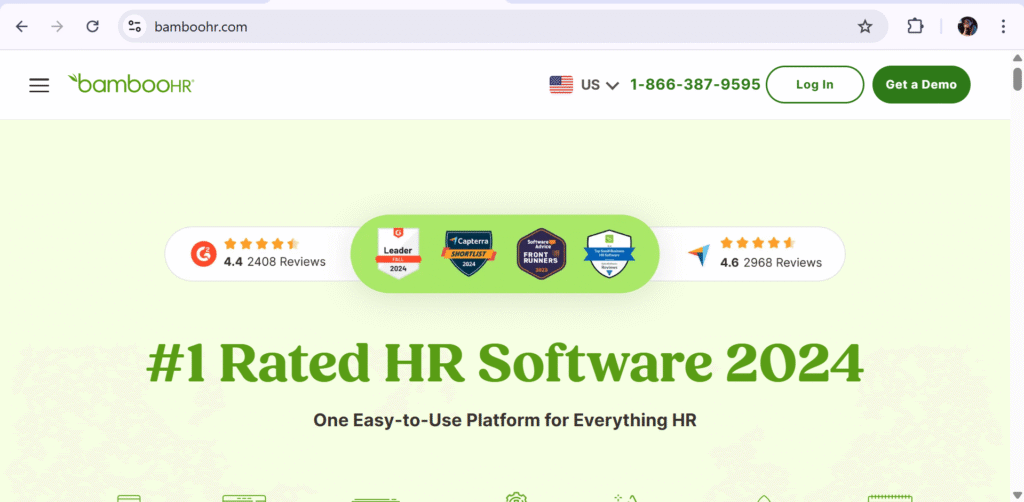
Overview
BambooHR remains one of the leading HRM (Human Resource Management) solutions for small to mid-sized businesses in 2025. Its platform is designed to streamline HR tasks, from onboarding and employee record management to performance tracking and time-off requests, making HR processes more efficient and less time-consuming.
The software is widely recognized for its intuitive, employee-friendly interface that allows HR teams to manage workflows without extensive technical knowledge. Features like centralized employee data, automated alerts, and customizable reports ensure that businesses can handle HR operations smoothly while staying compliant with labor regulations.
Although BambooHR is based in the US, it has seen global adoption, including in the UK and Europe, thanks to its flexible compliance options and robust integrations with payroll, benefits, and performance management tools. Its combination of ease of use, scalability, and comprehensive HR functionality makes it a preferred choice for growing businesses looking to improve their HR efficiency.
Features
- Employee data and records management
- Time-off tracking with customizable policies
- Onboarding workflows and e-signatures
- Employee self-service portal
- Performance review cycles and goals
- Customizable reports and dashboards
- Integrations with payroll and benefits tools
Review
Users praise BambooHR for its simplicity, intuitive interface, and fast onboarding process. HR teams find it especially useful for managing leave requests, tracking performance, and running HR reports. The mobile app also receives strong ratings for convenience and reliability.
Pros
- User-friendly and easy to set up
- Excellent customer support
- Custom workflows for onboarding and approvals
- Highly rated mobile app
- Expansive third-party integration ecosystem
Cons
- Not suitable for large enterprises
- No built-in payroll in all markets
- Limited analytics in base plans
Final Verdict
BambooHR is a reliable, beautifully designed HRM platform ideal for small to mid-sized businesses that need a clean, effective system for managing HR tasks and employee records.
2. HiBob (Bob)
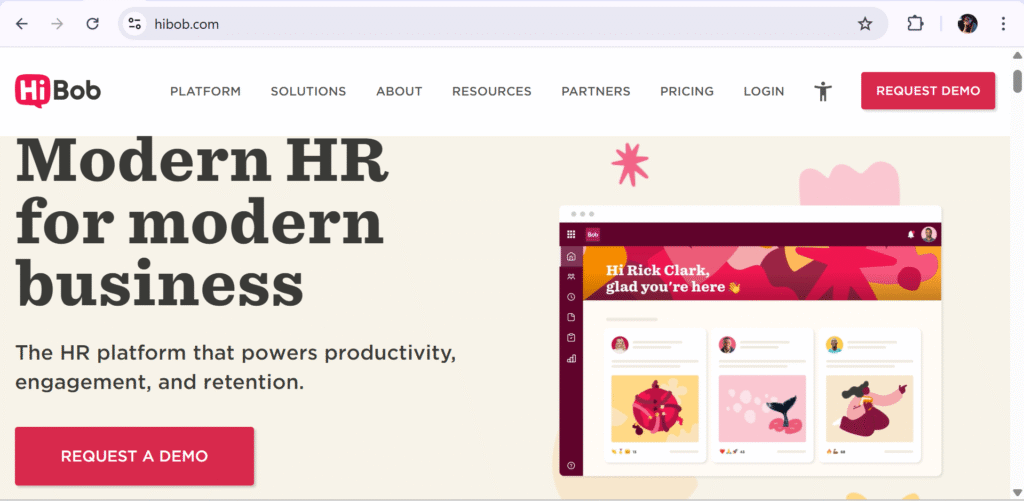
Overview
HiBob, commonly referred to as “Bob,” is a modern, people-centric HR platform designed for companies aiming to scale efficiently while nurturing a strong organizational culture. Its intuitive and visually appealing interface makes managing HR tasks—from onboarding and time-off tracking to performance management and employee engagement—both seamless and enjoyable.
The platform is particularly popular among tech startups, creative agencies, and global mid-sized firms, thanks to its flexibility and modern approach to workforce management. HiBob emphasizes employee experience, enabling HR teams to maintain transparent communication, monitor engagement, and foster collaboration across distributed teams.
With features such as automated workflows, customizable dashboards, and integrations with payroll, benefits, and productivity tools, HiBob empowers businesses to streamline HR processes while focusing on culture, growth, and employee satisfaction. Its blend of efficiency, scalability, and modern design makes it a preferred choice for forward-thinking organizations.
Features
- Core HR management with visual org charts
- Customisable workflows and onboarding journeys
- Time-off tracking and attendance management
- Surveys, engagement tools, and shoutouts
- Goals and performance tracking
- Built-in analytics and compliance tools
-
Integrations with Slack, MS Teams, and Google Workspace
Review
HiBob receives high marks for its clean interface, flexibility, and customisability. HR leaders particularly appreciate its modular setup, allowing them to tailor the platform to the company’s culture and structure. The onboarding and engagement tools are especially well received.
Pros
- Designed for growing, global teams
- Fantastic user experience and mobile support
- Engagement and performance features are top-tier
- GDPR-ready with strong compliance options
-
Excellent support and community resources
Cons
- May be costly for very small companies
- Some features require time to configure
- Lacks built-in payroll
Final Verdict
HiBob is perfect for scaling companies that want to go beyond basic HR and focus on culture, growth, and engagement while staying compliant.
3. Workday
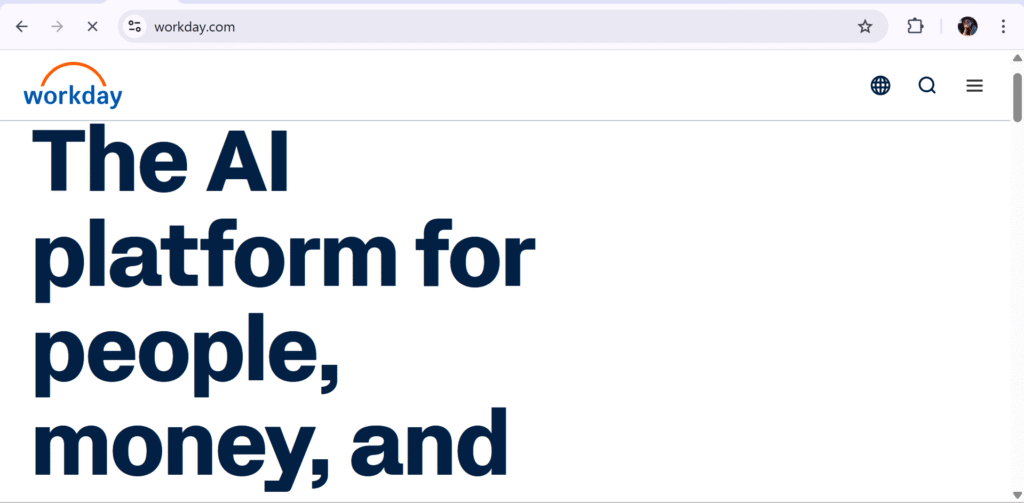
Overview
Workday is a leading enterprise-grade Human Capital Management (HCM) platform designed to meet the complex HR needs of large and global organizations. Renowned for its scalability, robust functionality, and cloud-based architecture, Workday provides a comprehensive suite of tools that cover every aspect of human resources management.
The platform supports payroll processing, benefits administration, talent acquisition, performance management, and workforce planning, all within a unified interface. Advanced analytics and reporting features allow HR leaders to gain actionable insights, optimize workforce strategies, and make data-driven decisions with confidence.
Workday’s integrated ecosystem ensures seamless collaboration across departments, helping enterprises manage employees effectively, reduce administrative burden, and enhance organizational efficiency. Its global compliance capabilities, customizable workflows, and mobile-friendly interface make it a trusted choice for multinational companies seeking a scalable and modern HCM solution.
Features
- Global HCM and payroll modules
- Real-time analytics and dashboards
- Talent management, recruiting, and succession planning
- Performance management and learning systems
- Role-based security and mobile access
- Integration with finance and ERP tools
Review
Workday is consistently rated as a leader for its breadth of features and robust analytics. It’s often chosen by large enterprises needing a fully integrated HR and finance ecosystem. Implementation can be long, but its scalability and security are unmatched.
Pros
- One of the most comprehensive HRM solutions
- Excellent for large and multinational organisations
- End-to-end HCM capabilities
- Built-in compliance with global labour laws
- Industry-standard analytics and security
Cons
- Expensive and time-consuming to implement
- Best suited for enterprises, not small teams
- Customisation may require partner support
Final Verdict
Workday is a top-tier choice for enterprises that need a fully integrated HCM platform offering advanced features, security, and global reach.
4. SAP SuccessFactors
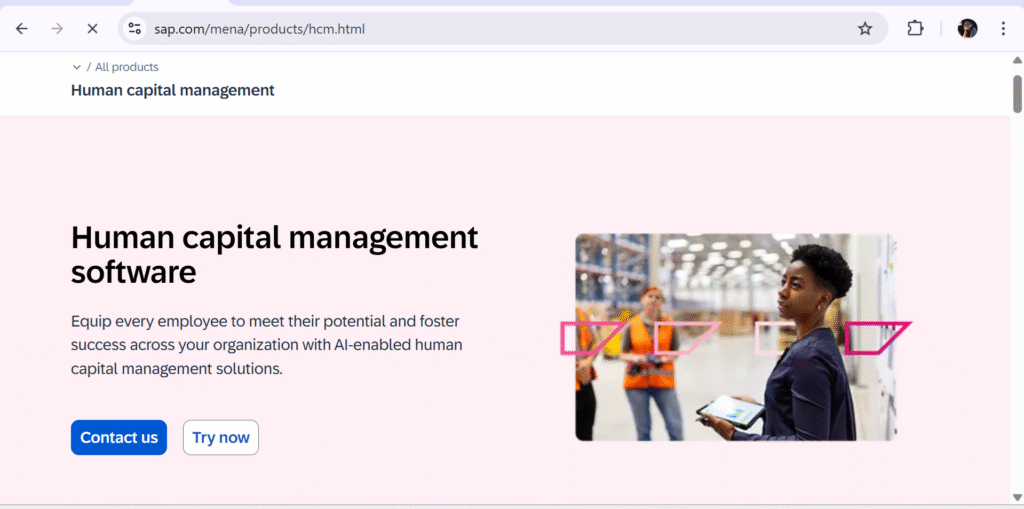
Overview
SAP SuccessFactors is a powerful enterprise-grade Human Capital Management (HCM) platform designed to streamline HR processes for large and multinational organizations. Its modular architecture allows businesses to implement specific HR functions—such as core HR, payroll, talent acquisition, onboarding, learning management, and performance management—based on their needs.
The platform is highly valued for its compliance capabilities, workforce analytics, and scalability, making it ideal for companies operating across multiple countries and regulatory environments. SAP SuccessFactors enables HR teams to optimize employee lifecycle management, improve productivity, and enhance talent development while maintaining global compliance standards.
With cloud-based access, intuitive dashboards, and robust integration options, SAP SuccessFactors allows organizations to drive strategic HR initiatives, improve employee engagement, and make data-driven workforce decisions. Its flexible and modular design ensures that businesses can scale and adapt the system as they grow, making it a trusted HCM solution for enterprises worldwide.
Features
- Employee Central for core HR
- Advanced goal and performance management
- Learning and career development tools
- Payroll and benefits administration
- Succession and workforce planning
-
Global compliance and localization support
Review
SAP SuccessFactors is praised for its powerful talent management tools and deep integration with SAP’s finance and ERP products. It’s especially valued in industries like manufacturing, finance, and government sectors for its configurability and depth.
Pros
- Scalable for thousands of users
- Modular and flexible architecture
- Excellent reporting and workforce analytics
- Integrated with SAP’s enterprise solutions
- Strong audit trails and compliance support
Cons
- Interface is less modern compared to competitors
- Customisation requires technical knowledge
- Expensive for smaller companies
Final Verdict
SAP SuccessFactors is best suited for large and complex organisations needing a deeply customisable, integrated HCM system with strong compliance features.
5. Gusto
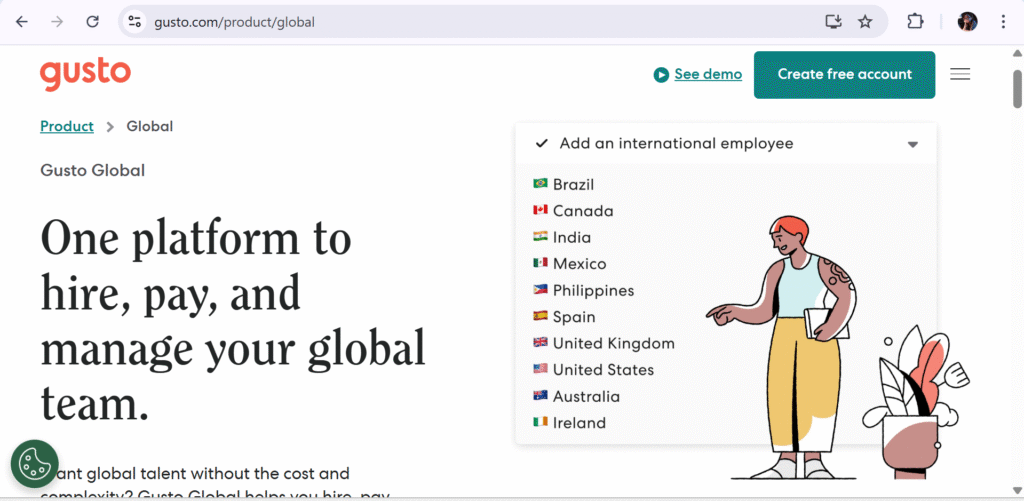
Overview
Gusto began as a payroll solution but has quickly evolved into a comprehensive HR platform tailored for small businesses. Its all-in-one system covers payroll processing, benefits administration, hiring, onboarding, time tracking, and compliance management, making it a versatile tool for growing teams.
Designed with simplicity and usability in mind, Gusto provides an intuitive interface that allows business owners and HR managers to manage employee workflows efficiently without extensive HR expertise. Its automation features streamline repetitive tasks, reduce errors, and ensure regulatory compliance.
Beyond payroll, Gusto helps small businesses enhance employee experience, from smooth onboarding processes to timely benefits management. With cloud-based access and robust integrations, Gusto enables small teams to save time, improve accuracy, and scale their HR operations effectively.
Features
- Full-service payroll processing
- Benefits and pension administration
- Onboarding checklists and e-signatures
- Time tracking and attendance tools
- Hiring and document management
- Compliance alerts and HR resources
Review
Small business users love Gusto for its simplicity, affordability, and automation. It’s an ideal choice for companies that want to combine payroll and HR into a single system without needing multiple providers.
Pros
- Affordable pricing tiers
- Seamless payroll and HR integration
- Automated tax filings and pension contributions
- Excellent onboarding and employee tools
- Great user experience
Cons
- Limited to small to mid-sized businesses
- Not built for complex international teams
- Some HR features are basic
Final Verdict
Gusto is ideal for small businesses that need a combined HR and payroll system that’s easy to use, affordable, and reliable.
6. Zoho People
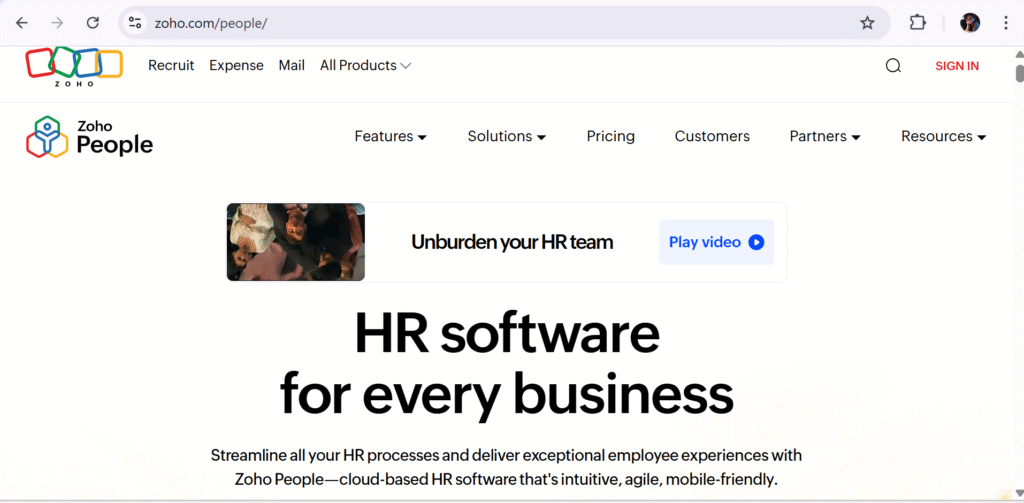
Overview
Zoho People is a cloud-based HR management solution from the Zoho suite, designed for businesses seeking flexibility, affordability, and seamless integrations. It provides a wide range of HR features, including employee records management, attendance tracking, leave management, performance evaluation, and workflow automation.
Ideal for small to mid-sized businesses, Zoho People allows organizations to streamline HR processes while maintaining control over employee data. Its cloud-based design ensures easy access from anywhere, enabling HR teams and managers to efficiently handle tasks without being tied to the office.
The platform integrates smoothly with other Zoho applications and popular third-party tools, enhancing overall productivity and simplifying processes such as payroll, recruitment, and reporting. With its user-friendly interface and scalable modules, Zoho People helps growing businesses manage HR operations efficiently while keeping costs manageable.
Features
- Employee data management
- Leave, attendance, and shift scheduling
- Onboarding and offboarding automation
- Performance reviews and feedback
- Custom workflows and self-service
- Integrates with Zoho Books, Zoho Recruit, and third-party apps
Review
Users appreciate Zoho People for its customisability and integration with the broader Zoho ecosystem. It’s particularly helpful for businesses using Zoho CRM or other Zoho apps and looking for a unified platform.
Pros
- Affordable and flexible pricing
- Strong workflow automation
- Great mobile access and self-service
- Easily integrates into existing Zoho systems
- Scalable across teams and regions
Cons
- Interface feels outdated to some users
- Limited advanced analytics
- Some setup required for full use
Final Verdict
Zoho People is a great choice for businesses already using Zoho or looking for a budget-friendly, flexible HR solution that can scale as they grow.
7. Deel HR
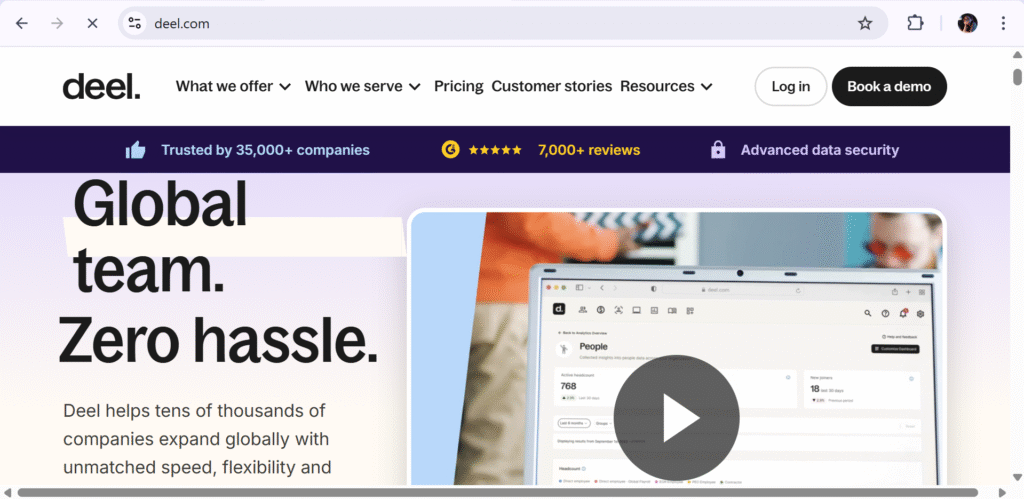
Overview
Deel HR is the HR management module of Deel, a leading global payroll and compliance platform. It is specifically designed for companies with remote and distributed teams, enabling seamless management of international employees and contractors.
The platform provides comprehensive tools for global hiring, onboarding, document management, and compliance monitoring, ensuring that organizations can meet local labor laws and tax regulations across multiple countries. Deel HR simplifies payroll, benefits administration, and contractor payments, making it easy to scale globally without operational headaches.
With its intuitive interface and cloud-based accessibility, Deel HR allows HR teams and business leaders to track employee data, manage contracts, and maintain compliance in real time, all from a single platform. It is particularly valuable for businesses embracing remote-first strategies and global workforce expansion.
Features
- Centralised employee records
- Global HR compliance tools
- Onboarding and contract management
- Time-off tracking and expense approvals
- Integrates with Deel’s payroll and EOR services
- Self-service portal for international employees
Review
Remote-first companies praise Deel HR for simplifying HR tasks across borders. Its strength lies in handling HR documentation, contracts, and compliance across dozens of countries, making it a must-have for global startups.
Pros
- Designed for remote and international teams
- Simple, modern interface
- Built-in compliance and contract generation
- Supports multiple currencies and regions
- Free tier available for smaller teams
Cons
- Limited HR depth (no ATS or performance reviews)
- Some features tied to paid payroll modules
- Newer to the HRM market compared to others
Final Verdict
Deel HR is ideal for global startups or companies with remote teams who need a simple, compliant solution for managing HR tasks across borders.
8. ADP Workforce Now
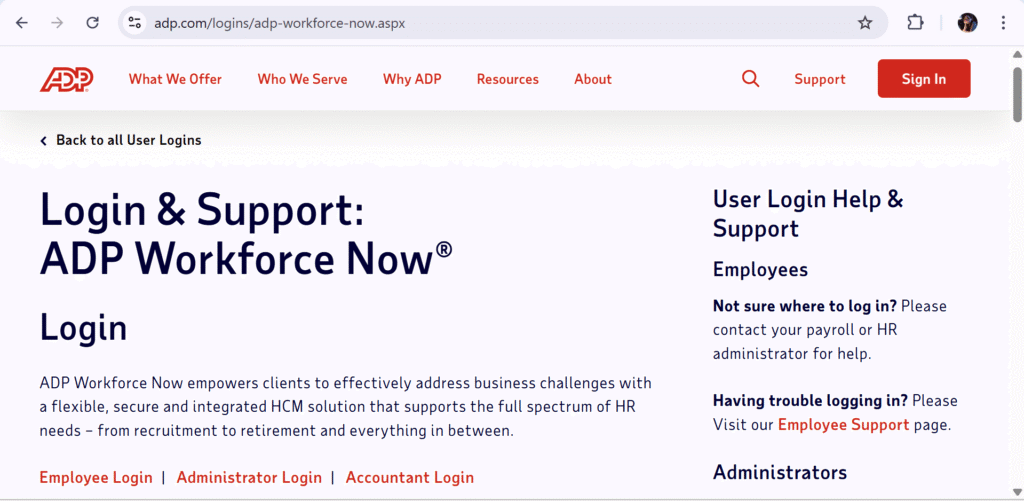
Overview
ADP Workforce Now is a comprehensive HR and payroll platform designed for mid-sized and large businesses. It unifies core HR, payroll, talent management, and benefits administration into a single, secure cloud-based solution, making workforce management simpler and more efficient.
The platform is renowned for its robust compliance features, helping businesses adhere to labor laws, tax regulations, and reporting requirements across multiple regions. ADP Workforce Now also provides advanced analytics and reporting tools, enabling HR teams and executives to make data-driven decisions.
With its scalable and user-friendly interface, ADP Workforce Now is trusted by companies worldwide to manage employee lifecycle processes—from onboarding and performance tracking to payroll processing and benefits management. It is particularly valuable for organizations seeking a secure, all-in-one HR solution that grows with their workforce.
Features
- Core HR and personnel tracking
- UK payroll, RTI filing, and pension auto-enrolment
- Time and attendance tracking
- Employee benefits and compensation tools
- Talent acquisition and performance management
- GDPR and labour law compliance tools
Review
ADP Workforce Now is widely praised for its reliability, especially in industries requiring detailed compliance and audit trails. Its scalability makes it ideal for organisations expanding across multiple locations or managing diverse workforce segments.
Pros
- Trusted global payroll and HR brand
- High compliance accuracy
- Scalable for complex workforce needs
- Comprehensive reporting tools
- Excellent support and account management
Cons
- Not ideal for small businesses
- Can be expensive for startups
- User interface feels outdated to some users
Final Verdict
ADP Workforce Now is perfect for mid-sized and large enterprises looking for a robust, compliance-first HRM and payroll platform with deep configurability.
9. Paycor
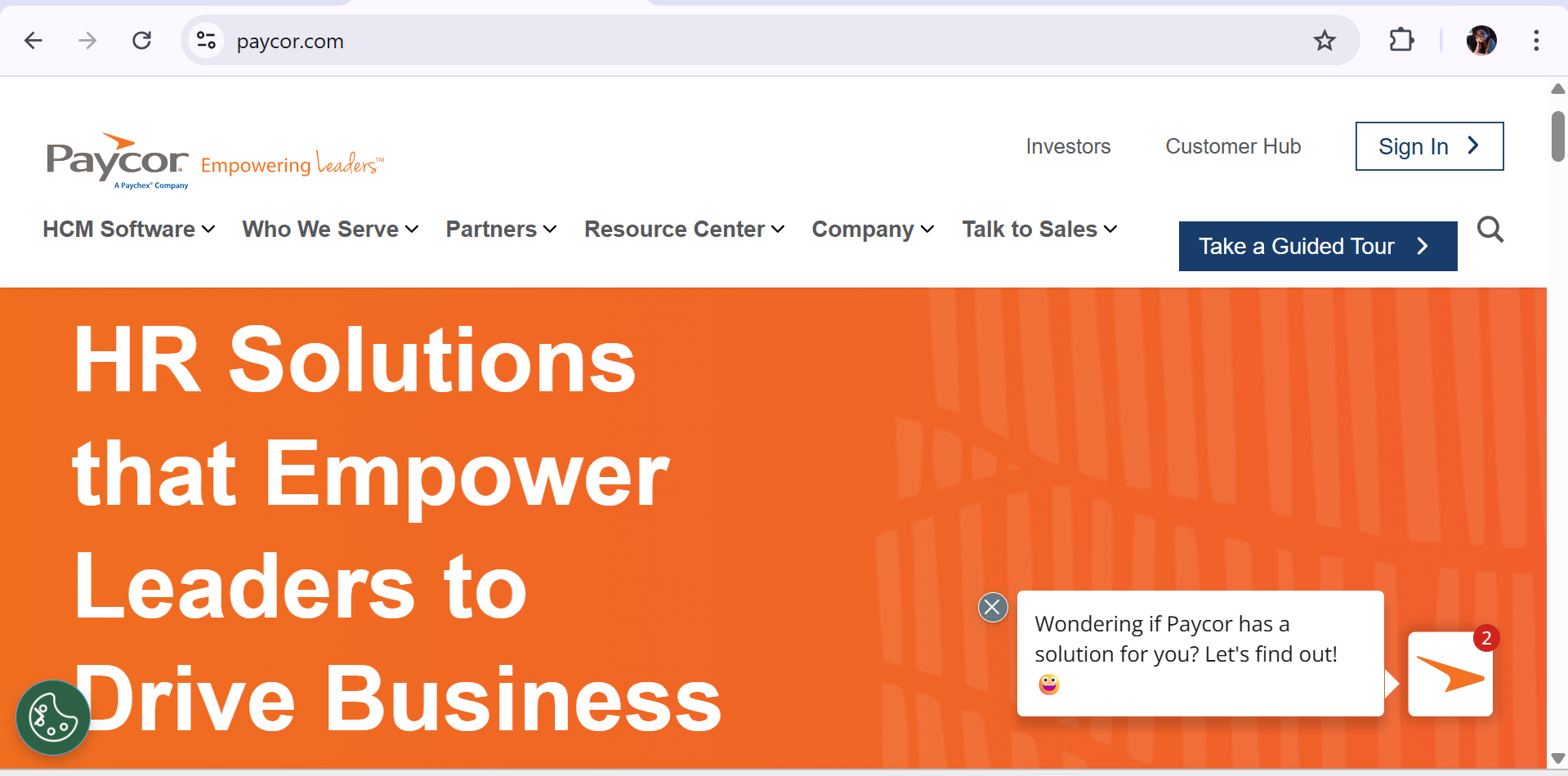
Overview
Paycor is an HR and payroll solution that focuses on streamlining workforce management for mid-sized businesses. With tools that span from recruiting to retirement, Paycor offers a full suite of HRM capabilities with a strong emphasis on compliance, user experience, and automation.
Features
- Payroll and tax automation
- Onboarding and applicant tracking
- Workforce scheduling and time management
- Learning management and performance tools
- Benefits administration
- Analytics and compliance reporting
Review
Users appreciate Paycor’s well-rounded features and powerful analytics. HR leaders note that it reduces manual processes and improves payroll accuracy. The employee self-service portal also gets high marks for user experience.
Pros
- Strong compliance and payroll integration
- Good value for mid-market businesses
- Helpful employee self-service tools
- Powerful onboarding and ATS features
- Responsive support and documentation
Cons
- Interface can be overwhelming at first
- Limited international capabilities
- Some modules priced separately
Final Verdict
Paycor is well-suited to UK and US-based companies that need a mid-market HR solution with strong automation and compliance features.
10. Rippling
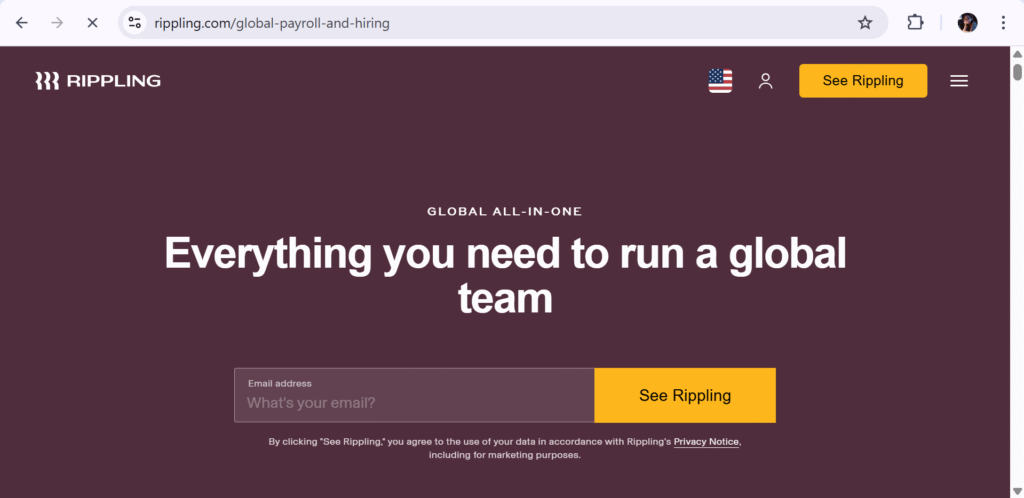
Overview
Rippling is a unified HR and IT platform that helps companies automate every aspect of the employee lifecycle—from onboarding and payroll to device management and app provisioning. It’s a favourite among tech startups and modern teams due to its sleek interface and powerful automation.
Features
- Global payroll and compliance
- Core HRIS and document management
- Time tracking and time-off policies
- Benefits administration and onboarding
- App provisioning and device management
- Integrations with over 500 third-party tools
Review
Rippling is highly praised for its elegant design and automation capabilities. IT teams and HR managers alike appreciate the ability to handle HR, payroll, and IT functions from one platform.
Pros
- Modern, unified platform
- Strong global compliance support
- Easy to scale across roles and regions
- Excellent third-party integrations
- Custom workflow automation
Cons
- Higher learning curve for advanced features
- Some modules only available in higher tiers
- Newer global payroll features still maturing
Final Verdict
Rippling is ideal for tech-forward companies and remote teams who want to combine HR and IT into one cohesive platform.
11. Personio
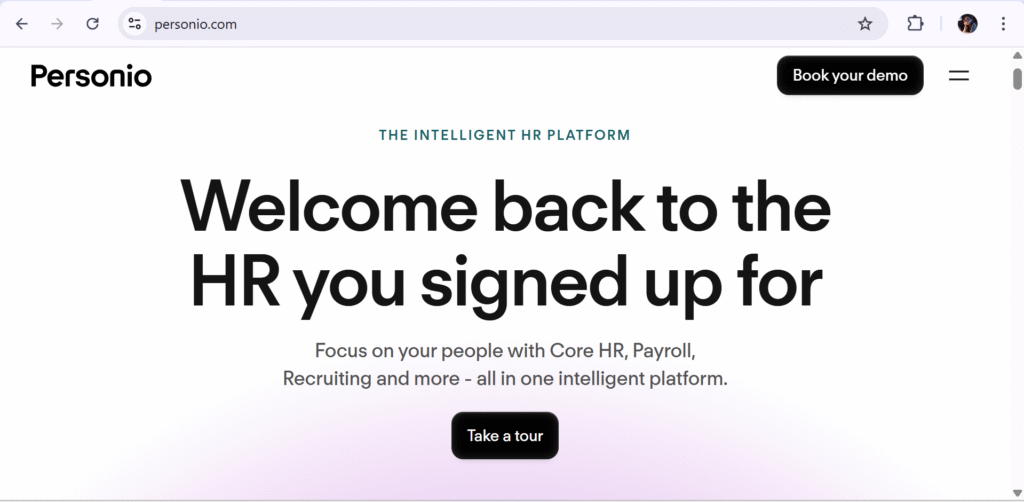
Overview
Personio is a fast-growing all-in-one HRM software built specifically for European SMEs. It’s known for its simplicity, modular design, and strong focus on compliance. It covers core HR, recruiting, performance, and time management—all with native GDPR features.
Features
- Centralised employee database
- Onboarding, offboarding, and task templates
- Applicant tracking and hiring pipelines
- Absence and time-off management
- Performance management and feedback
- Integration with Google, MS 365, and accounting tools
Review
Users praise Personio for its modern UI and easy setup. It’s especially popular with HR departments in Germany, the UK, and the Netherlands for its well-thought-out compliance design and native support for local labour laws.
Pros
- Affordable and modular pricing
- Designed for European businesses
- User-friendly and GDPR-compliant
- Strong ATS and onboarding tools
- Fast implementation
Cons
- Limited payroll features outside Germany
- May lack advanced analytics
- Less suitable for large enterprises
Final Verdict
Personio is a top pick for small to mid-sized European businesses seeking a simple, scalable HRM tool that handles compliance and recruiting seamlessly.
12. Namely
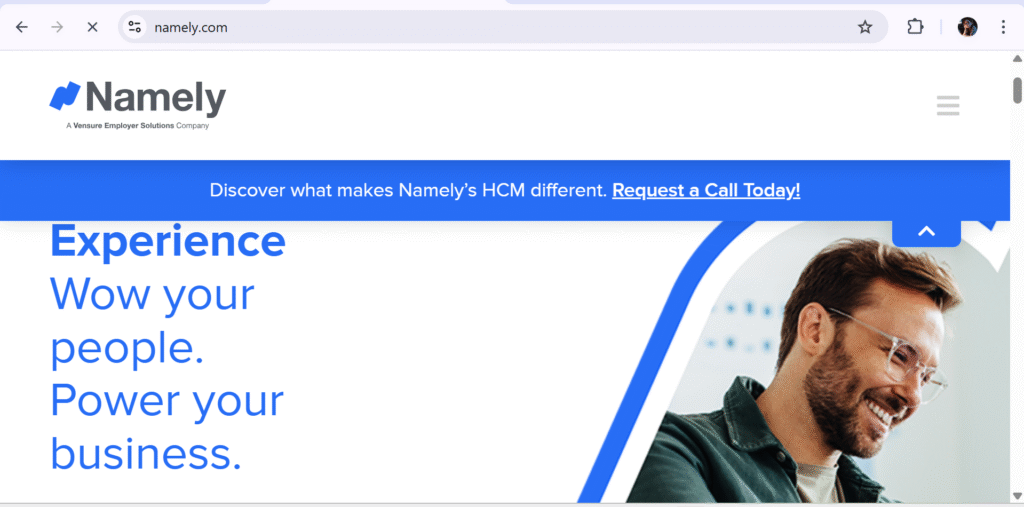
Overview
Namely is a cloud-based HRM platform designed for mid-sized businesses that want modern tools without losing personalisation. It offers core HR features along with built-in payroll, benefits, performance, and compliance tools.
Features
- Employee records and time-off tracking
- Payroll and benefits administration
- Performance reviews and goals
- Onboarding workflows
- Analytics and dashboards
- Compliance and audit reporting
Review
Namely is often praised for being “just right” for companies that are too big for entry-level tools but too small for enterprise suites. Its interface is easy to navigate, and the modular design allows teams to scale features over time.
Pros
- Mid-market focused with modern features
- Intuitive interface for employees and admins
- Payroll and HR in one platform
- Personalised support and onboarding
- Modular pricing
Cons
- Not available globally
- Fewer integrations than larger platforms
- May require third-party consultants for setup
Final Verdict
Namely is perfect for mid-sized teams seeking a user-friendly, full-service HRM platform that feels personal but scales with growth.
13. Sage HR
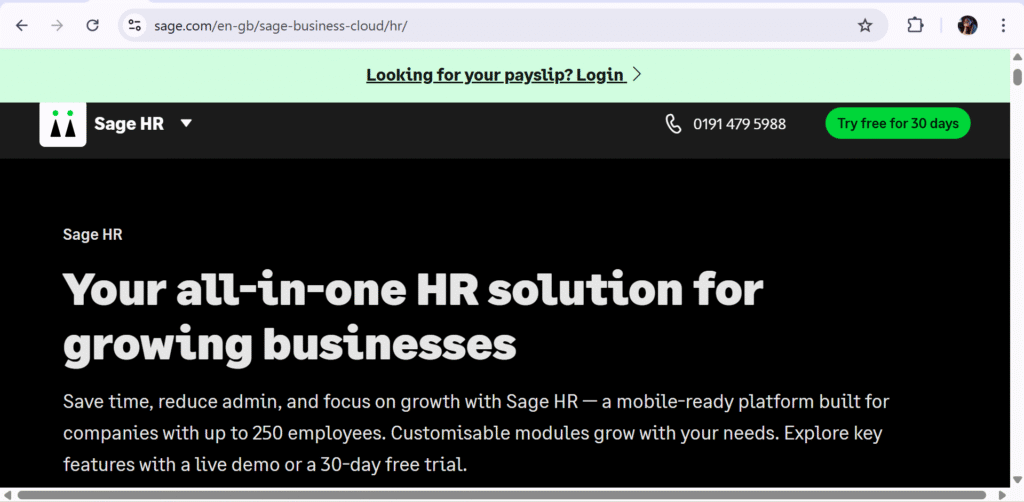
Overview
Sage HR (formerly CakeHR) is a user-friendly HR platform developed in the UK for small and mid-sized companies. Backed by Sage, it provides a solid range of tools to handle employee management, leave tracking, performance, and shift planning.
Features
- Time-off management and public holiday settings
- Shift scheduling and timesheets
- Onboarding workflows and document storage
- Performance review cycles
- Mobile access and self-service portal
- Integrates with Sage Payroll and Xero
Review
UK users appreciate Sage HR for being tailored to local requirements and offering strong holiday and shift management tools. It’s especially useful in hospitality, retail, and other industries with shift workers.
Pros
- Affordable and UK-focused
- Great for shift-based teams
- Simple and mobile-friendly
- Strong time-off and scheduling features
- Easy to deploy
Cons
- Limited reporting depth
- No in-built recruitment
- Not ideal for large teams
Final Verdict
Sage HR is ideal for UK SMEs in need of a localised, easy-to-use HR tool with time-off and shift management built in.
14. Breathe HR
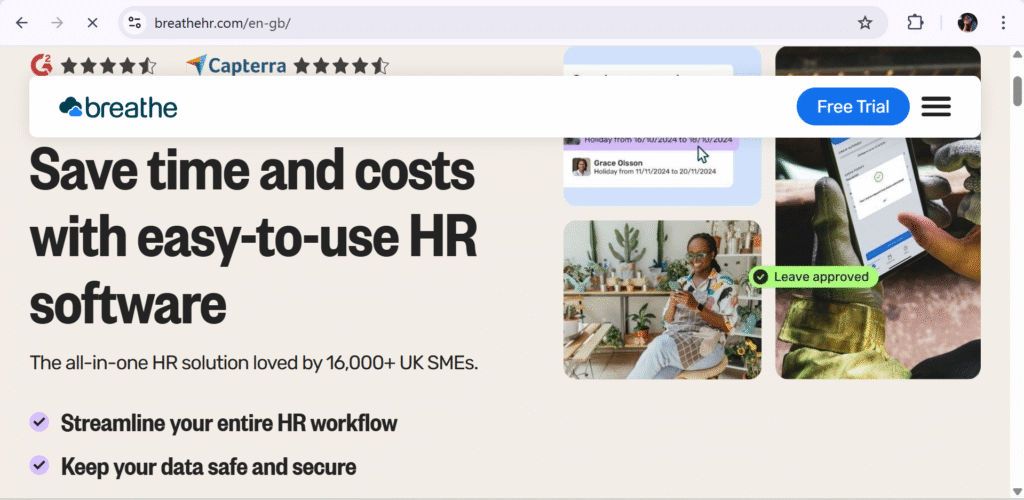
Overview
Breathe HR is a lightweight, UK-based HR platform for small businesses. Focused on simplicity and affordability, it offers a clean interface, solid holiday tracking, and document management, making it a favourite for startups and companies with under 100 employees.
Features
- Leave and holiday management
- Employee database and document storage
- Performance review templates
- Sickness and absence tracking
- Simple reporting and reminders
- GDPR-compliant cloud storage
Review
Breathe HR gets excellent feedback for ease of use and affordability. It’s one of the few HRM tools truly built for very small UK teams that don’t want to pay for features they won’t use.
Pros
- Built specifically for UK small businesses
- Affordable fixed monthly plans
- Easy onboarding and support
- Great for basic HR needs
- Clean, intuitive interface
Cons
- No ATS or payroll module
- Limited integrations
- Basic analytics
Final Verdict
Breathe HR is perfect for microbusinesses and startups in the UK that want a simple, no-fuss HR platform that’s cost-effective and compliant.
15. Oracle HCM Cloud
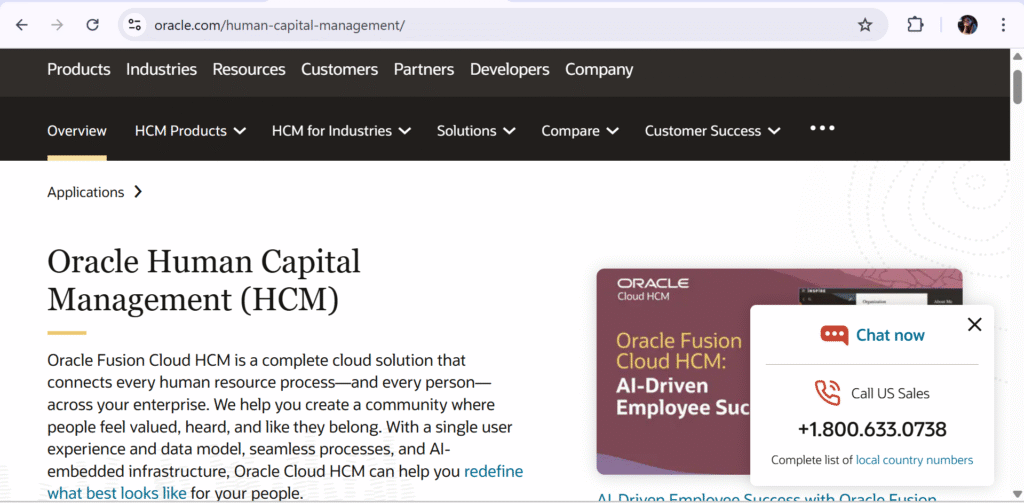
Overview
Oracle HCM Cloud is a global Human Capital Management platform designed for large enterprises. Known for its configurability and breadth, it supports everything from core HR and payroll to advanced talent and workforce planning across multiple countries.
Features
- Global core HR and workforce directory
- Payroll, benefits, and compensation planning
- Recruiting, onboarding, and succession planning
- Performance and learning management
- AI-powered insights and workforce analytics
- Compliance tracking across regions
Review
Enterprises appreciate Oracle HCM for its robustness, global support, and integration with Oracle’s financial and ERP systems. It’s chosen by multinational corporations with complex HR requirements.
Pros
- Extremely robust and enterprise-grade
- Highly customisable workflows
- Global compliance and multi-country payroll
- Advanced reporting and AI tools
- ERP and finance integration
Cons
- Very expensive
- Long implementation cycle
- Requires specialised support
Final Verdict
Oracle HCM Cloud is best for large, multinational organisations seeking a unified HR, finance, and workforce planning platform with end-to-end global compliance.
Conclusion
In 2025, choosing the right HRM software isn’t just about ticking boxes—it’s about finding a system that aligns with your business’s vision, supports your workforce goals, and simplifies everyday processes. Whether you’re a startup with five employees or a multinational with tens of thousands, there’s a platform that fits your needs.
From budget-friendly tools like Breathe and Sage HR for small UK firms to enterprise-grade systems like Oracle HCM and Workday for global corporations, the HRM landscape in 2025 offers remarkable flexibility, automation, and compliance readiness.
As hybrid work continues to evolve and global hiring becomes more mainstream, the best HRM software will be the one that grows with your team, adapts to regulation, and empowers HR to be a strategic driver of company success.
Frequently Asked Questions (FAQs)
What is HRM software used for?
HRM (Human Resource Management) software is used to manage employee information, leave, time tracking, onboarding, performance reviews, payroll integration, and compliance in one central platform.
What HRM software is best for small businesses?
For small businesses, Breathe HR, Gusto, and Sage HR offer the best mix of affordability and ease of use with built-in compliance features.
Which HRM systems include payroll?
Gusto, ADP Workforce Now, Paycor, and Oracle HCM Cloud include native payroll features. Others like BambooHR and HiBob integrate with payroll providers.
What’s the difference between HRM and HCM software?
HRM (Human Resource Management) focuses on core HR functions like tracking employees, time-off, and documents. HCM (Human Capital Management) is broader, adding payroll, benefits, learning, and workforce planning.
Is HRM software secure and compliant with GDPR?
Most top HRM software platforms are GDPR-compliant, offering role-based access, encryption, and data control features. Always confirm compliance if operating in regulated industries.
